Our new series Wake Up Wisdom provides you with precious pieces of insight to support you on your path of practice. Over the coming months, we will present to you different questions from young sanghabuilders and facilitators around the topics of mindfulness practice, sangha life, overcoming difficulties in relationships and more. The responses were given by monastics to participants at the International Wake Up Ambassadors Online Retreat in May 2020. And we would like to encourage you – the readers – to offer your own experiences and insights when practicing with this topic in the comments section down below, so that our community can benefit from collective insight.
(Title photo by Raphaël Brouard)
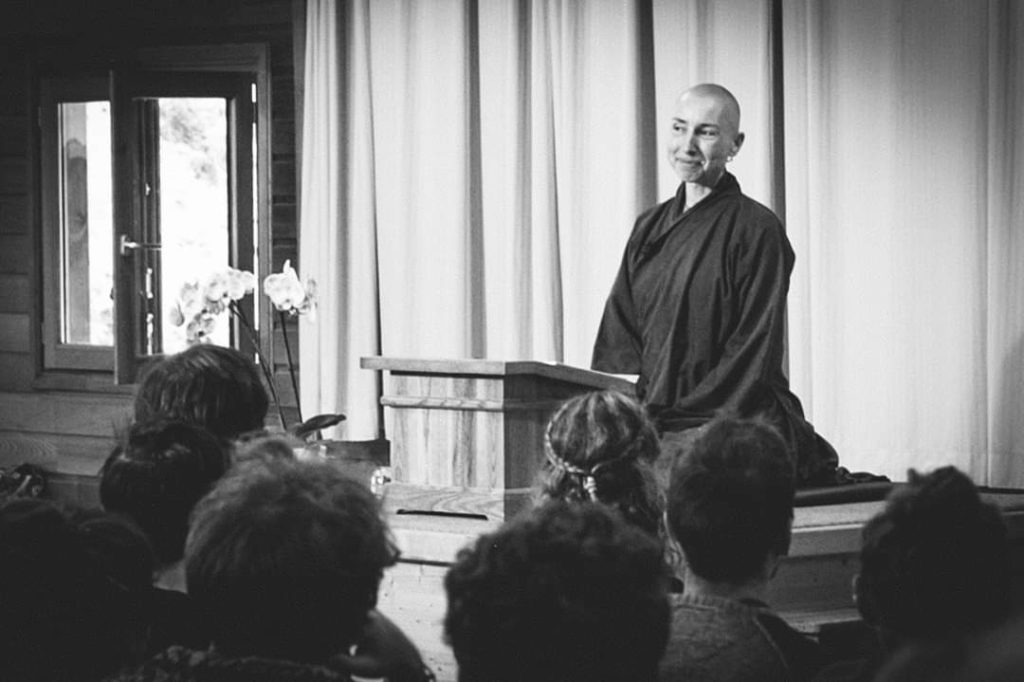
Question: How do you balance work and self-care, if you are really passionate about your work?
Response by Sister Hien Nghiem (Sr True Dedication)
Thank you for this question. I will try my best to share from my experience. I’m also still a work in progress. My whole life is a work in progress.
Work is also life
I think one insight that has helped me the most is to realize that work is also life, that it’s not something separate. It’s not that I go and I do work and then my life starts outside of my work. I think it was this insight that helped me leave my job before, because I realized that my job in a newsroom was so toxic. I realized I couldn’t be a full human being while doing that work. And that gives me a great perspective. Because now, when I do mindfulness meditation Dharma stuff in the monastery, or cleaning toilets, or gardening, it’s like “Wow, this is totally life in a way that the newsroom couldn’t be life”. So I feel very lucky and I always remind myself of that.
Am I still able to work in freedom?
When I get caught up in something I ask myself “Am I still able to work in freedom?” I say to myself “Would I be happy to die tomorrow? Do I feel that I’ve lived this day well, that I have put my energy in the directions that have the most meaning?” So that’s very helpful because one of the aspects to work is “what are we going to do and what are we not going to do?” This is already very important.
The second aspect is: “When are we going to do it and when are we not going to do it?” This is about being a free person and mastering ourselves and choosing the life we want to live and how we’re going to live it. It takes a certain amount of stepping back and reflection.
Living a balanced day
I actually took two or three days in February this year to look at the six months ahead to say “How do I want to live my time, what are my deepest values, my deepest aspirations? And how – each day – can I be realizing my long term dream but also be living a balanced day?” So it’s very important I think that as a practitioner, a meditator, we give ourselves that time to step back and just check in with our life. “Am I happy with how I am with my body at the moment? Am I happy with my health? Am I doing enough exercise? Am I happy with my dream? Is every day a step to realizing my dream? Am I happy with my relationship? Am I investing enough time in the relationships that mean the most to me?” So we do have to take time, and it might have to be more than a day, but take time to really look at all these areas of our life and see: Is it in balance and are we living the kind of life we want to live?
Having a strategy for our life
The monastery really helped me because we have a program which is nice and balanced. I don’t know if you have a good program in lockdown, but that’s quite a challenge. The discipline of allocating, Thắy describes this as having a strategy for our life: ‘In the morning I’m going to do this and this and this; every day I will do exercise; every day I will try and get out and be with nature even if it’s just the one tree in my back garden: I will sit and breathe with it for a bit.’ We all need a strategy. If we just go on and be free and easy and just let life flow, we’ll get pushed around by life and we won’t really be sovereign to ourselves and how we will be living our days. And we may struggle to realize our aspiration and the things that would be most fulfilling for us to do.
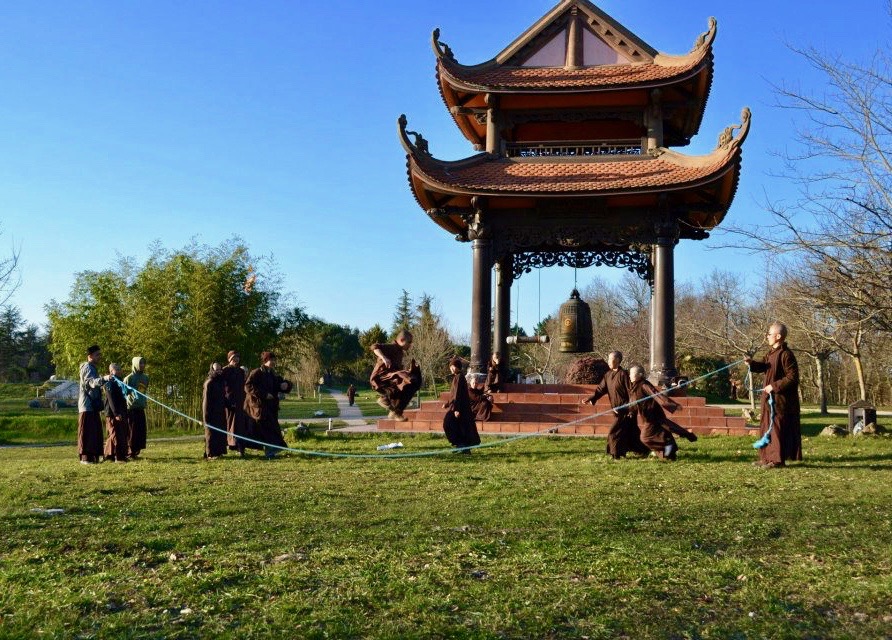
Savouring the best moments of our day
Sometimes we don’t always know what’s the most fulfilling, so one exercise that can really help with this is: at the end of the day before you fall asleep, take a few moments. Maybe sit upright on your bed and just close your eyes and revisit the day and see where our time went. Because sometimes we can get swept up in something, or caught in things and we can lose quite a bit of time in areas that aren’t so rewarding for us. And then the moments, which might have been like sitting and having a meal with our housemates or going for a walk in the park, we may tend to undervalue them because they don’t seem to be high-effective things to do in your day, but they may actually be the most deeply rewarding and nourishing. I discovered this about myself, when I trained myself to do this daily exercise of reflection at the end of the day and I realized that laughing with other people and being out in nature were always the best moments of my day. And I really learned to savor those moments just before I went to sleep and that gave me the deep aspiration to make sure I always had time for those things in my ideal day.
I will be happy when…
I think when we have a big dream or some work that’s really nourishing and inspiring, that really gets us excited, we may fall into this striving, this kind of goal thing, like “I will be happy when” . . . . and it’s like “I can’t be happy now. I’ll only be happy when I finish this thing”, right? So there’s this sense that we lose something in the present moment because we think we can only be happy when we’ve completed this task or project or work. And that’s really something to be vigilant about and to pay attention to. “Am I postponing my happiness until I’ve done this thing?” And that’s why for me it really helps to have this “What if I die tomorrow” thing, because it’s like “what if this project will never be completed, but I can say that I’ve lived every hour of it? It has been fulfilling, has been rewarding and I’ve been able to be my true self while I do it”. So it’s our mindfulness that lets us know when we’re in that kind of striving energy and it’s also our mindfulness that can give us a reality check and then we realize: “Okay, no. How can I do this differently?”
The work of a practitioner
So we have to look at “How is my body when I’m working? How are my meals? Am I having good nutriments through the day? And how is my exercise? How are my relationships?” When all these things are in balance, then our work can be fulfilling, effective and productive. It can be the work of a practitioner because we are present while we’re doing it. Then we can do all the inner work while we’re at the computer I guess, since many of us might work on computers. Then there’s all sorts of things going on at the computer: We’re practicing generosity, we’re practicing concentration, we’re practicing letting go, we’re practicing listening to the people we’re collaborating with. Work is also practice. In that realm we’re practicing through the emails, through the projects, and we can do that when we ourselves are in a good place.
Whatever happens, keep your joy
It is super helpful to have a bell, whatever kind of bell. It can be your favorite music track and you do a little jiggle or it can be a normal bell or like the clock chimes like we have in Plum Village. To have something at least every half an hour is so important. Otherwise we completely forget that we have a body while we’re working at the computer. So the bell is a key thing to keep that freedom while we’re working. And joy, keep your joy – whatever happens, keep your joy. And if it’s not making you joyous, find something that is joyous because life is too short, people. Too short and we need to offer our joy to the world. Thank you for the question.
Transcribed by Elaine Fisher and edited by Verena Böttcher.
Click here to read Wake Up Wisdom #2: Learning to Trust

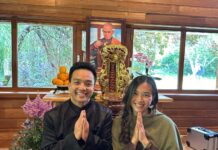

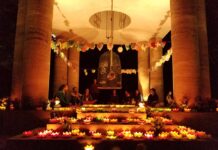

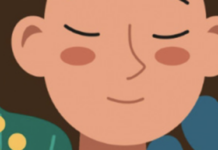
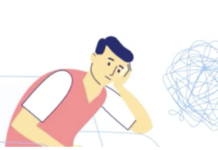
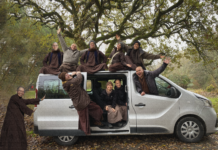
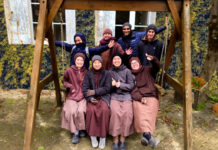







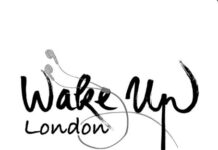
Thanks for this beautiful sharings. I am going to apply little by little of this wisdom into my daily life.